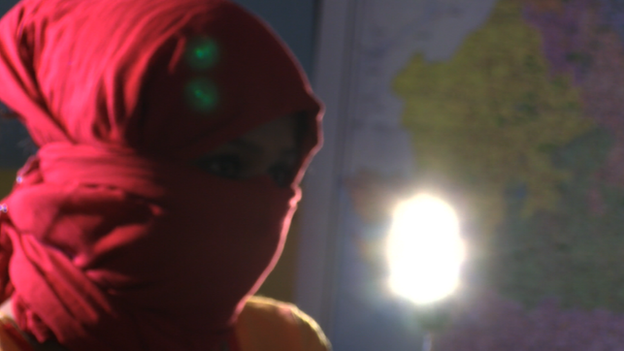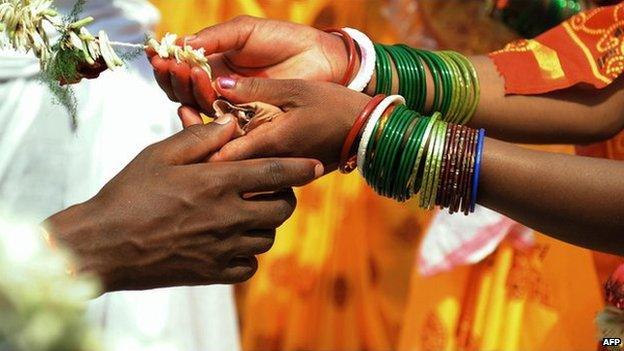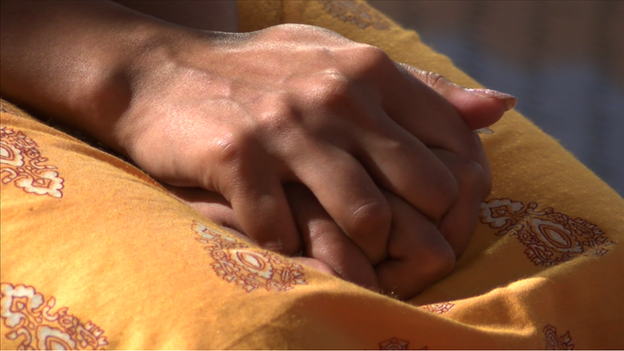India marital rape victims' lonely battle for justice
- Published

Victims of marital rape refuse to give up the fight
A government minister recently stirred a debate when he told the parliament that marital rape could not be criminalised in India as "marriages are sacrosanct" in the country. BBC Hindi's Parul Agarwal reports on the controversy.
Tying and untying a piece of cloth around her face, Rashmi (not her real name) tries to conceal her identity as we prepare to interview her on camera. "If my landlord identifies me, he will throw me out," she says.
The 25-year-old is a victim of marital rape and is fighting a lonely battle for justice.
"I was only a toy for him which he thought he could use differently every night. Whenever we had a fight, he would take it out on me in bed. There were times I pleaded with him to stay away because I was unwell, but he would not take a no for an answer, not even during my periods."
In India, it is not a crime for a man to rape his wife. And many believe that marriage is a source of sexual satisfaction for men and, therefore, women must submit.
No equality
In February, India's Supreme Court rejected Rashmi's plea to declare marital rape a criminal offence. The court said it was not possible to order a change in the law for one person.
Rashmi's story is similar to any other educated young woman in India who fell in love with an office colleague and married him. But their relationship has never been about "consent" and "equality", she says.

In a government survey, 10% of the women interviewed said their husbands had forced them to have sex
"I still remember the night of 14 February 2014 which was also his birthday. We had a heated argument and then he forced himself on me. I resisted as hard as I could, but he didn't stop. And then he inserted a torch inside me. I had to be admitted to hospital and I bled for 60 days after that."
Campaigners have long demanded that marital rape be criminalised in India.
A committee formed after the December 2012 gang rape and murder of a student on a bus in Delhi to suggest criminal law reforms recommended that martial rape should invite the same punishment as any other rape. The government of the day, led by the Congress party, rejected the recommendation.
Victims of marital rape, however, refuse to give up the fight.
Pooja, mother of three daughters, suffered in silence for 14 years before she could muster the courage to come out and file a case of domestic violence against her husband. The prime reason for their separation, she says, is "forced and violent sex".
"I had no right to say no because I was his wife. I was managing the children and the house singlehandedly. But he never showed any consideration."
Pooja has now separated from her husband, but she refuses to legally divorce him because she thinks that would allow him to remarry.
"I cannot let him use me and move on to another woman and ruin her life. I don't want a divorce, I want him to be punished," she says.
Widely prevalent
Supreme Court lawyer Karuna Nundy who specialises in human rights litigation and gender justice says Indian law provides little relief to victims of marital rape.
"At the moment, a wife can file a case under the domestic violence act which are dealt with in a civil court. It gives a woman a legal right to separate from her husband on the grounds of cruelty.

Victims of martial rape say society often blames them for maligning the institution of marriage
"But what is the legal provision to punish the act of crime? Any sexual act which is forced or is being done without the consent of the woman is a crime. The relationship of the victim with the perpetrator makes no difference."
A number of studies done over the years suggest that sexual violence in marriage is prevalent in India.
The last National Family Health Survey (2005-2006), conducted among 124,385 women in 29 Indian states, had 10% women reporting that their husbands had physically forced them to have sex.
Another study conducted by the International Centre for Women (ICRW) and United Nations Population Fund's (UNPFA) across seven states in India last year covered 9,205 men and 3,158 women aged 18-49 from each state. One-third of the men interviewed admitted to having forced a sexual act on their wives.
The victims of "marital rape" say they fight a lonely battle because their suffering falls under no category of Indian legal system. Moreover, society often blames them for maligning the institution of marriage.
However, Save the Family Foundation, a men's rights group, cautions against criminalising marital rape.
"We have already seen how 498A, the anti-dowry law, has been largely misused by women in India to harass men and their family. The Central Woman Commission of India has accepted that a number of rape cases reported each year are false. How can one prove a marital rape? Taking bedrooms to court is a dangerous idea," a spokesman said.
As we wrap up the interview, Rashmi uncovers her face and says: "On every court hearing, I see my husband and his family completely unaffected and without any regrets about what has happened.
"Why is it that a woman has to hide her identity to stop being hounded? Why am I looked down upon if I tell the world that I have been raped by my husband?"